In this article
Even if your beloved canine companion is all grown up, waking up in the middle of the night can still be common for them. They may need to take a pee or poop because they ate late that day or drank too much water right before bedtime. However, waking up every night may not be normal. It might be because they sleep too much during the day, because of their age, or because there’s something more serious going on.
Let’s explore the common reasons that your otherwise perfect pup is waking you up at night and what you can do about it.

How Much Sleep Do Dogs Need?
Puppies require 12 to 20 hours of sleep a day. However, this is often broken into several little naps scattered throughout the day. These naps usually follow moments of sudden bursts of energy, often referred to as the zoomies.
Conversely, adult dogs need around 12 hours of sleep a day, while senior dogs may need a bit more to rest their old bones.


The 6 Reasons That Dogs Wake Up At Night
Dogs may wake up in the middle of the night for various reasons, such as the need to relieve themselves, a lack of exercise during the day, hunger, thirst, boredom, anxiety, and fear, among others. There may also be an underlying health issue that is affecting their sleep.
Let’s take a closer look.
1. Medical Issue
Waking up early in the morning or the middle of the night can be a sign of underlying medical issues. Conditions like urinary tract infections, cognitive dysfunction, kidney disease, diabetes, hormone imbalances, gastrointestinal disorders, or even sore muscles can trigger a sudden urge to eliminate, pain, or discomfort, prompting your pup to seek your attention.
Even if your dog has only recently started waking up one or more times during the night, it is important to consult a veterinarian promptly.
Did you know that you can speak with a real vet online about your dog’s health?
If you need to speak with a vet but can't get to one, head over to PangoVet. It's our online service where you can talk to a vet online and get the advice you need for your pet — all at an affordable price!

2. Potty Breaks
If your dog regularly wakes you up at night to go potty and there are no apparent underlying health issues, mealtimes could be the culprit. Specifically, if your dog goes from eating to sleeping right before bed without having the opportunity to go outside, chances are that the urge to eliminate will wake them up in the night. Typically dogs will need to go poop or pee about 30-60 minutes after eating. So be sure you’re feeding your dog dinner with plenty of time to go outside before bedtime.
3. Hungry/Thirsty
Adjusting your dog’s feeding schedule can help minimize these nighttime interruptions. Dogs are typically fed twice a day, or about 12 hours apart. If your pup is waking up in the middle of the night hungry, you may need to move that evening meal a little later in the day or consider a small snack before bed. Just make sure there’s plenty of time to get a potty break in before bed.

4. Boredom
One reason that your dog may wake you up is boredom, especially if they haven’t gotten enough exercise during the day. So, if your pup is bursting with pent-up energy after night falls, you should increase their physical activity and playtime during the day.
Don’t forget that your dog also needs to exercise their brain! To tire out your pup physically and mentally, challenge their minds with activities like nose work, puzzle toys, or obedience classes. By combining mental stimulation with physical exercise, you can create ideal conditions that allow for a peaceful night’s sleep for everyone.
5. Separation Anxiety
If your dog scratches, barks, or whines at your bedroom door after being shut out, they might be dealing with separation anxiety. A simple solution could be allowing them to sleep in your bedroom, albeit on their own bed.
Perhaps your furry friend is already sleeping in your room at night, even in your bed, but they keep waking you up because they move around all night, snore or because of other reasons. You might benefit from training your dog to sleep in a crate in the corner of the bedroom or even in another room. Of course, this is easier said than done, especially for dogs that have been allowed to sleep with their owners since they were tiny puppies.
It’s possible to train most dogs to sleep somewhere other than their owners’ bed or bedroom, but it does take a great deal of training, patience, and repetition. Also be sure that you’re giving your dog plenty of attention during the day to help strengthen your bond.
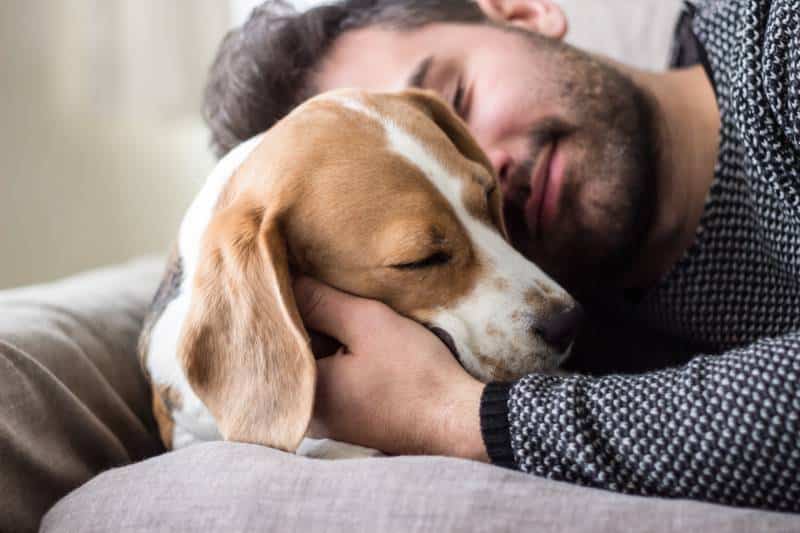
6. Sleep Disorders
Although relatively rare, sleep disorders in dogs include insomnia, sleep apnea, narcolepsy, and REM sleep behavior disorder. Insomnia is more common in older dogs and usually stems from underlying behavioral or medical problems. Causes include canine cognitive dysfunction (the human equivalent of dementia), anxiety, stress, pain, and excessive itching resulting from allergies.
If your dog suffers from insomnia, you may observe behaviors like pacing, whining, or barking during the night. Your dog may also try to wake you up simply because they find comfort in your presence.

What to Do Once Your Dog Is Awake
If your pup wakes you up in the wee hours of the morning because they’re bored or want to play or have a second dinner, it’s probably best to just ignore them. Dogs wake up easily but learn from what works and what doesn’t, when it comes to getting your attention so ignoring their attempts can break the habit.
That said, you should determine the reason for these nighttime awakenings before deciding to ignore your dog, hence the need to consult a veterinarian first, especially if this behavior has appeared suddenly.
Tips for Helping Your Dog Sleep Soundly
Ignoring your dog’s non-urgent nighttime awakenings is one way to help them get back to sleep. Here are other tips so your dog (and the entire household!) can easily drift back into the arms of Morpheus:
- Take your dog for a full potty break right before bedtime to reduce the chance of multiple awakenings due to bathroom needs.
- If possible, set up a designated space inside your home where your dog can relieve themselves during the night.
- Put your dog’s bed or crate in a quiet room or area of your home.
- Provide puzzle toys or interactive toys to satisfy your dog’s mental needs and to prevent boredom-induced awakenings.
- Train your dog to sleep in a crate, even if it means placing it in your bedroom for a while so they can get used to it.
- Make sure your dog gets enough playtime and exercise during the day.

If you need to speak with a vet but can’t get to one, head over to PangoVet. It’s our online service where you can talk to a vet online and get the personalized advice you need for your pet — all at an affordable price!

Bottom Line
Your dog may wake you up at night for various reasons, with the most common being the need to go potty, boredom, thirst, or hunger, but underlying health issues should not be overlooked.
It’s best to seek help from a veterinarian, as it can sometimes be difficult to understand your dog’s signals. Fortunately, in most cases, dogs wake their owners at night just because they want their attention, so simply ignoring their attempts can help stop this behavior.
In short, understanding their signals and responding appropriately will help both you and your dear four-legged friend enjoy a restful night’s sleep once again.
See also:
Featured Image Credit: dogboxstudio, Shutterstock


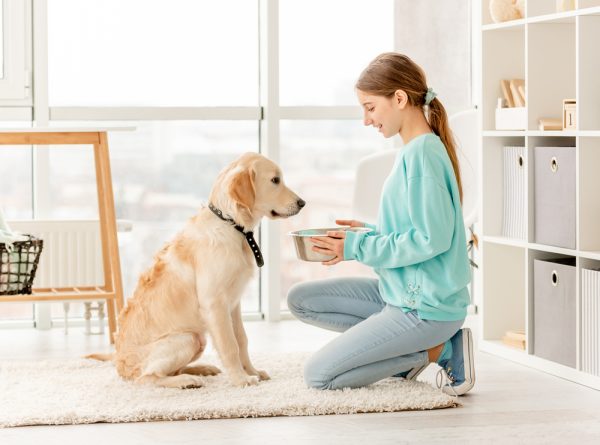
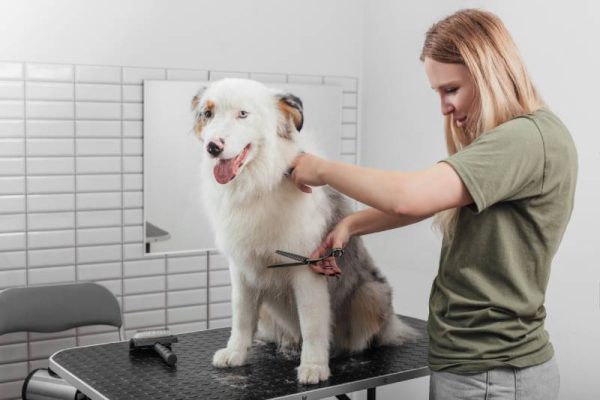
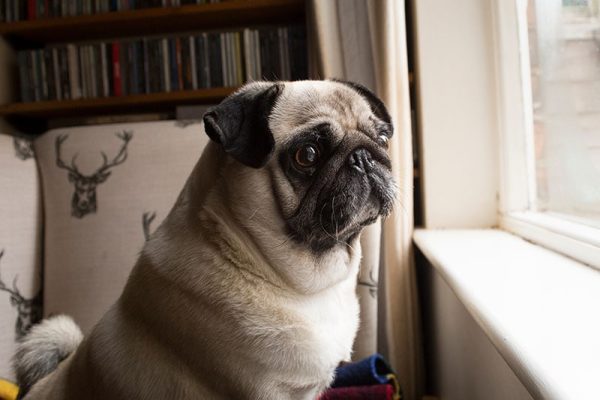



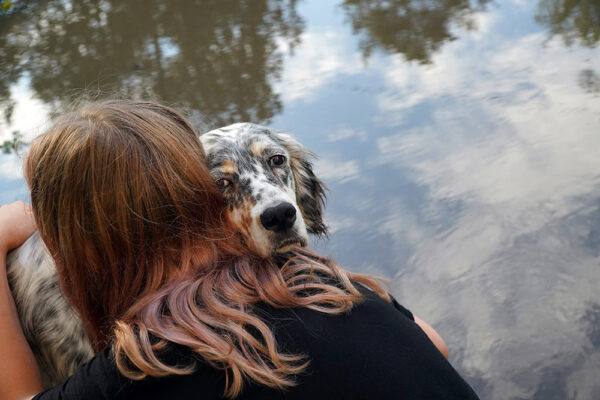












6 Responses
My lad dog is always hungry but I can’t give him any snacks because he has digestive problems
He also appears to have skin allergies because he licks himself all the time so
Lately he howls and scratches on door to go out at midnight til about 3am.
He will be 2 years in March and I’ve had him 2 months
I think he is homesick for his dog friends at previous home and I only have a cat.
He is hash trained but continues to lunge while walking him to be with other dogs
I’m frustrated and have hidden anger as I fell down trying to hold him back need advice in dealing with his stomach and finding a trainer that doesn’t give treats for rewards
Hello Rachel,
thank you for reaching out to us and sorry for a bit of a late reply. I am very sorry to hear about your dog's health and behavioral issues. I totally understand that it can be a lot to deal with. As this point I believe the consultation with a veterinarian would be the best course of action.
I would recommend you to book an online video-call appointment with one of our professional veterinarians from www.PangoVet.com. They will gladly discuss your dog's behavior, digestive and skin issues and give you their opinion on what should be the next course of action plus some expert tips. You can also show your dog's skin either on camera, or take photos and upload them before the meeting. This is very accessible and affordable service and our vets will do their best to help.
Best wishes!
My 5 and a half year old lab has always been a good sleeper, in the garage on his own comfy bed. He has in the past few months, more so in the past few weeks, been scratching at the door in the middle of the night. I get up, take him out to wee, and sometimes he'll go back to sleep. He gets two walks a day, plenty of attention and eats well. He's also started humping his lounge bed.
Hello Kathy,
thank you for sharing this with us. Sorry to hear about the issues with your Labrador. It is possible that there could be some underlying medical condition, so we would suggest you booking an online videocall appointment with one of the veterinarians from www.PangoVet.com. Through the 20-minute videocall, you can go through this issue and the vet will help you figure out the cause and the next steps that you can take.
Hope this helps.
my little dog is 5 yrs old and gets me up 1 to 3 times to go out and pee. I've taken all the advice and tried them all. if I don't let him out he will pee in the house. does anyone have any further advice please.
Hi Judith, thanks for reaching out. It sounds like you're doing your absolute best, it can be exhausting waking up for frequent toilet breaks. Since you've already tried a variety of advice, it could be a good time to visit your vet to rule out any medical conditions. Frequent urination can be a sign of underlying medical conditions such as urinary tract infections, bladder stones, or diabetes. Alternatively, we do have an online vet service, PangoVet, where you can speak to a qualified and experienced veterinarian, and they can help answer any questions you may have and help you come up with an action plan to help your pup. You can book a video consult with our team at https://pangovet.com – I hope that helps!